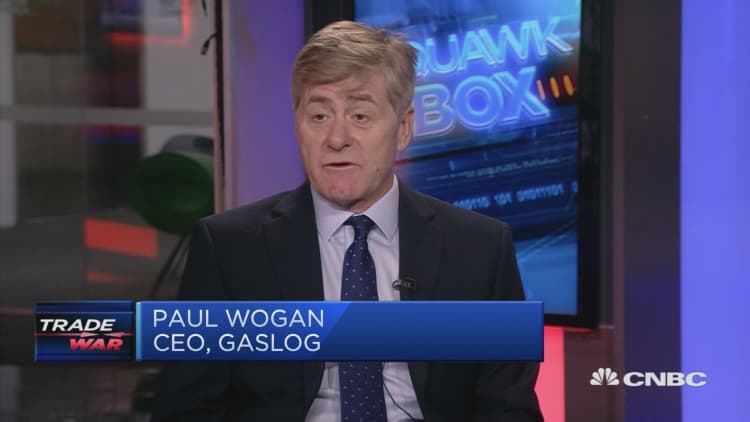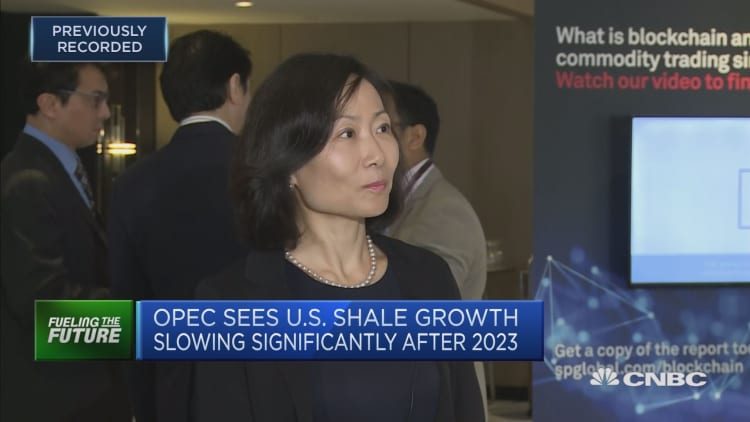Beijing's tariffs on U.S. liquefied natural gas threaten to raise prices for buyers throughout Asia and deal a self-inflicted wound to China's state-owned energy companies.
The import tax on American LNG essentially removes U.S. suppliers from consideration at trading desks across China's growing LNG market. There are plenty of supplies elsewhere in the world, but in closing the door to U.S. LNG, China is throwing a wrench into the market and giving sellers an opportunity to hike prices.
In the year through June, China was the second biggest buyer of U.S. LNG, according to energy research firm Wood Mackenzie.
China is trying to shift from coal to cleaner-burning natural gas as the government aims to reduce air pollution. But the country's domestic gas production and pipeline imports are not growing fast enough to meet demand, so China is turning to LNG, a form of natural gas super-chilled to liquid form and transported by sea in massive tankers.
Despite its dependence on LNG, Beijing nevertheless imposed a 10 percent tariff on U.S. supplies last month, retaliating after the Trump administration slapped a 10 percent import tax on $200 billion of Chinese goods.

The world's two largest economies play an influential role in the on-demand market for LNG — China as a buyer and the United States as a seller. Their trade dispute promises to redirect LNG trade routes and reverberate throughout the market.
It also comes ahead of winter, when demand is highest and LNG customers are vulnerable to price spikes.
"The market has been balanced to tight this year," said Bob Ineson, IHS Markit executive director for global LNG.
"You're probably going to be in a fairly strong pricing environment through the winter."
Chinese buyers have already moved to limit the impact by purchasing most of the LNG they'll need to meet demand this winter, according to Wood Mackenzie.
The firm estimates that China will need to buy about 8 million tons of LNG on the spot market, where commodities are purchased for immediate delivery or shipment in the near future.

"The impact will depend on how short the market runs this winter and the extent to which China needs to buy additional LNG, which will partly be determined by weather," said Giles Farrer, research director for global gas and LNG supply at Wood Mackenzie.
U.S. companies like Cheniere Energy pump a lot of LNG into the spot market, providing a chunk of flexible supplies for buyers who want to swap cargoes to take advantage of price differences and shorter delivery times.
Analysts say Chinese buyers will try to swap cargoes as much as possible to avoid the tariffs on U.S. LNG. If they can't find other cargoes, they'll be stuck paying the 10 percent duty.
But China may have to pay a premium in any case, said Farrer. Since China artificially raised prices on U.S. LNG by 10 percent, suppliers in Australia, Qatar and Southeast Asia can get away with charging Chinese buyers just below the cost of LNG from the United States, including the tariff.
That markup would tack another $4 million to $5 million on LNG cargoes for Chinese buyers, according to Wood Mackenzie.
Those costs would be absorbed by the state-owned companies like CNOOC, PetroChina and Sinopec, which dominate the country's LNG purchases. On the opposite end, American suppliers like Cheniere and traders like Trafigura and Vitol would stand to benefit.

The situation provides an incentive for European LNG buyers to resell U.S. cargoes to Chinese energy companies, said Katie Bays, head of energy and industrials at Height Capital Markets.
The resales, already an emerging trend this year, allow European utilities to capitalize on high LNG prices in Asia. They also allow China to avoid tariffs because once LNG is loaded into European storage tanks, it is no longer considered American gas, Bays said.
Asian LNG prices need to trade about $3 per million British thermal units above European prices for the reloadings to make economic sense, according to Wood Mackenzie. The gap between the prices has narrowed, but the firm anticipates those conditions will return this winter.
According to Bays, the United States would make more money in every one of those scenarios.
"If you add inefficiencies to the market, the result of that — and the only result of that — is that prices will have to go up to compensate the market and create a new, efficient solution," said Bays.
"If you're a seller, that's a great place to be. If you're a trader that's a great place to be," she said. "But if you're a buyer, it's a tough spot."


